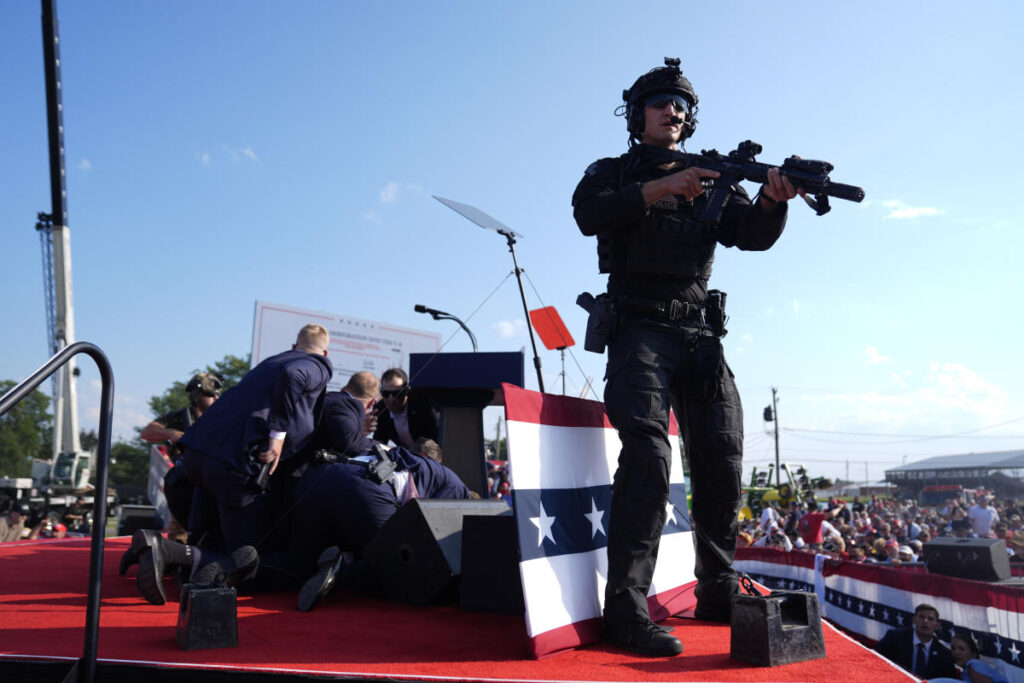In a shocking revelation, two men who survived the assassination attempt on former President Donald Trump during a campaign rally in Pennsylvania this summer expressed their outrage over the perceived negligence of the U.S. Secret Service in ensuring his safety. David Dutch, a 57-year-old ex-Marine, and 74-year-old James Copenhaver, a retired liquor store manager, shared their harrowing experience during an exclusive interview with NBC News. While enjoying the rally from the bleachers, the men were suddenly caught in the chaos when a gunman, identified as 20-year-old Thomas Matthew Crooks, opened fire from a nearby unsecured rooftop, resulting in injuries to Trump and the tragic death of another man, Corey Comperatore, who died protecting his family.
Dutch vividly recounted the terrifying moment, describing the sensation of being shot as akin to being struck by a sledgehammer. The scene quickly devolved into pandemonium, with debris from the bleachers and metal fragments flying in all directions. Reflecting on the incident, Dutch expressed his ongoing anger and disbelief that such a situation could unfold, stating firmly that it “should have never happened.” Conversely, Copenhaver echoed Dutch’s sentiments, asserting that the shooting could have been prevented if the event had been properly secured. The horror of that day left a significant mark on both men, who are now contemplating legal action against the Secret Service for what they perceive as a grave failure in duty.
The shooting incident is described as a “significant operational failure” by Kimberly Cheatle, who was serving as the Secret Service director at the time. Following the incident, Cheatle faced immense scrutiny from lawmakers and constituents alike, ultimately leading to her resignation in the summer. The attack marked a tumultuous period for the Secret Service, which drew both public and political ire over its handling of the situation. In the aftermath, the agency has been urged to reevaluate its security protocols to prevent future failures and protect not just high-profile individuals like Trump but also innocent bystanders who attend such public gatherings.
As the legal ramifications of the attack unfold, both Dutch and Copenhaver remain vocal advocates for accountability, emphasizing that the Secret Service’s perceived negligence poses a significant threat to public safety. Their experience represents not just individual suffering but also a broader concern for the effectiveness of protective measures at political events. The shooting has raised critical questions about the adequacy and enforcement of security protocols aimed at safeguarding public figures who are often the focus of intense scrutiny and threats.
Trump, having returned to the Pennsylvania fairgrounds where the assassination attempt occurred, has used the incident to galvanize support for his political campaign. He characterized the event as a pivotal moment in his journey, urging his followers to channel their energy into delivering a decisive Election Day victory. His rhetoric linked his survival of the shooting to a broader crusade against the adversaries he perceives threaten both his political ambitions and his life. This narrative seems to resonate with a segment of his base, solidifying their loyalty and support amidst ongoing controversies surrounding his candidacy.
In conclusion, the aftermath of the assassination attempt on Donald Trump brings to light deep-seated concerns over the security measures employed by the U.S. Secret Service. The experiences shared by Dutch and Copenhaver, along with the tragic story of Corey Comperatore, shed light on the potential ramifications of operational failures in the security apparatus. As the nation moves forward, the ongoing discourse surrounding accountability and public safety will likely shape the political landscape and influence future approaches to security at major events. The realities of that day will not easily fade, serving as a reminder of the stakes involved in contemporary American politics.

